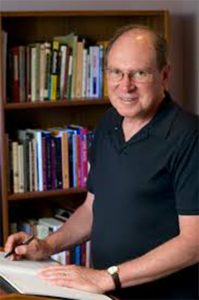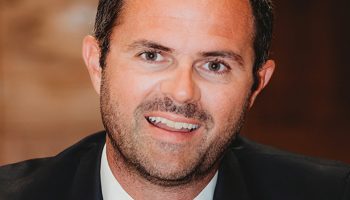
At one point during his time at Walter Reed Army Hospital, Dr. Robert J. Wicks was approached by a doctor who asked for his help. “He said he was going down the tubes,” Wicks said, “and I told him he couldn’t go straight home from work every day. He said, ‘Why not?’”
Wicks reminded the doctor of the signs in restaurant bathrooms requiring employees to wash their hands before leaving.
“He was leaving Walter Reed (emotionally) contaminated; bringing it home to his family,” Wicks said. “I told him he needed to debrief before leaving, or even simply sit quietly, letting the dust settle.”
At 2 p.m. EDT Thursday, Aug. 27, on the CHQ Assembly Video Platform, Wicks will help Chautauquans understand the meaning of self-care in his lecture, “Night Call: Embracing Compassion and Hope in a Troubled World,” as part of the Week Nine Interfaith Lecture Series. Author of a book of the same name, he is a clinical psychologist, prolific author and recipient of the Holy Cross Pro Ecclesia et Pontifice, the highest lay honor of the Catholic Church. Following his lecture, there will be a live Q-and-A session. Viewers are invited to submit questions for Wicks via the submission portal at www.questions.chq.org from any mobile or desktop browser, or on Twitter, using #CHQ2020.
“We have invited Dr. Robert Wicks to conclude our week on the theme, ‘The Future We Want, the World We Need,’” said Maureen Rovegno, Chautauqua’s director of religion, “because for decades he has spoken calm into chaos for individuals and groups experiencing great stress, anxiety and confusion — all of which have been expressed and discussed in our online conversations this Assembly Season.”
“I practice what might best be called ‘resiliency psychology,’” Wicks said. He assists health care professionals and caregivers in preventing secondary stress, creating balance and distance between themselves and their work. “I teach how to better maintain, and regain, a healthy perspective — (in other words), how to reach out without being pulled down.”
Wicks is a professor emeritus at Loyola University Maryland, and has over 35 years’ experience in secondary stress prevention. He has spoken to both professionals and laypeople, from the Mayo Clinic to the North American Aerospace Defense Command. He has spoken to and treated caregivers in “20 countries at last count,” including China, Vietnam, India, Thailand, Haiti, Northern Ireland, Hungary, Guatemala, Malta, New Zealand and South Africa. Notably, in 1994, Wicks debriefed relief workers evacuated from Rwanda, assisting them in processing horrific and painful experiences of the genocide. Wicks listened to their stories and provided guidance for post-traumatic stress.
“They needed to understand,” he said, “that they were not crazy; their situation was.”
Essentially, he said, “I do darkness for a living. If I’m not careful, I’ll be pulled in.”
He often debriefs with colleagues, and turns to his own faith for reassurance and balance. He said that the three most important elements to his practice are “presence to self, presence to others, and presence to something greater — in my case, my faith.”
Rovegno thinks there is no better time to hear from Wicks.
“The cumulative effects of the COVID-19 pandemic, the undeniable awareness of racial injustices, the deprivations of social and economic inequalities, and the terror of climate degradation and examples of suffering humanity across the globe,” she said, have necessitated a deeper look at how people practice self-care and remain resilient.
When it comes to the COVID-19 pandemic, Wicks said, “as doctors and nurses, we must recognize the guilt” borne of the inability to save everyone, as well as “the fear of bringing infection home” to families.
“Guilt and vulnerability are natural,” he said. For people in general, a common stressor is the over-consumption of news media.
“We only need five minutes to get the news,” he said. Anything longer, he said, is detrimental to a person’s health.
Wicks also cautioned against dreaming of a new normal.
“It’s nice to have a fantasy,” he said. “But instead, think of the advantages (to the current situation). Be intrigued by new opportunities, new talents. Help yourself to access silence and solitude (even during lockdown). Create a schedule. … Instead of drifting or dripping through the day, flow through it.”
Rovegno is excited to hear Wicks’ perspective and suggestions for a healthier way forward.
“Dr. Wicks will point us to the future we want and the world that we need,” she said, “not just to survive, but to thrive.”
This program is made possible by Week Nine “Program Sponsor” Erie Insurance and the Joan Brown Campbell Department of Religion Endowment.




